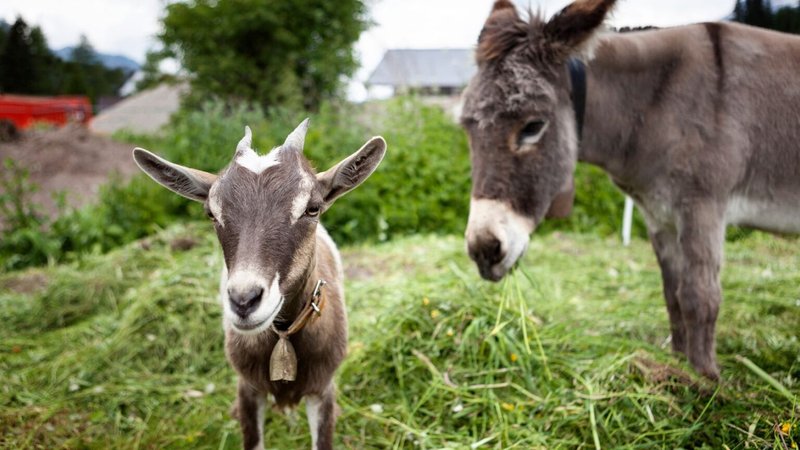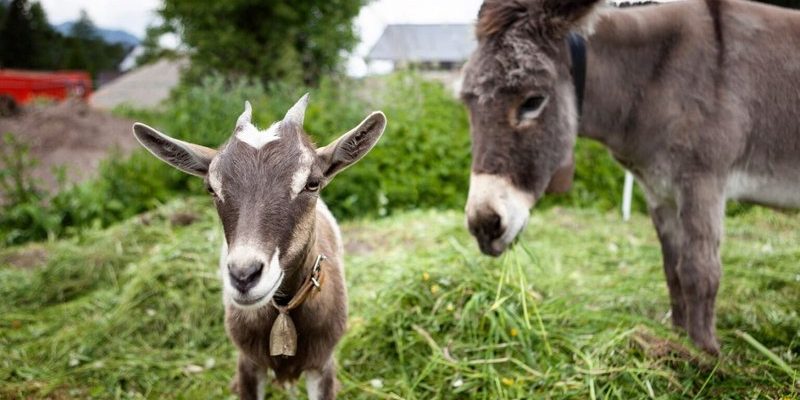
So, can donkeys live with horses, goats, or sheep? The answer is a resounding yes, but with a few important details to consider. Donkeys are social creatures, and they thrive when they have companionship. But just like hosting a dinner party, not every animal is going to get along perfectly. Some might be more compatible than others, and understanding their needs is key to creating a harmonious environment on your farm.
Understanding the Nature of Donkeys
Donkeys are fascinating animals with a personality all their own. They tend to be more independent than horses, often displaying a stubborn streak that might surprise first-time owners. Despite their quirks, they are incredibly loyal and form strong bonds with their companions. In the wild, donkeys live in small groups, which means they’re used to having friends around.
When it comes to mixing donkeys with other barnyard buddies, their social nature plays a big role. They enjoy the company of other animals, especially if they’ve been raised with them. That said, donkeys need certain social conditions to thrive. They’ll be happiest when they have a buddy, whether that’s another donkey or one of the other animals we’ll talk about.
Honestly, it’s essential to consider a donkey’s temperament and the social dynamics within your group. Donkeys tend to be more protective than other livestock, which makes them great companions for goats and sheep, who might need a bit of guidance in a mixed herd.
Can Donkeys Live With Horses?
Yes, donkeys can live with horses, and many people find that they make great companions. They share some similar needs, like grazing habits and space requirements, but there are a few things you should keep in mind. Horses are generally more energetic and can be more flighty compared to donkeys. This difference in temperament can lead to some interesting interactions!
When introducing a donkey to a horse, you might notice the donkey’s more laid-back attitude. You could think of the donkey as the cool older sibling, keeping an eye on the more excitable horse. However, be sure to supervise their initial interactions. Not all horses and donkeys will get along right away. Some horses may be intimidated by the donkey’s presence, while others might be overzealous and not understand how to play nicely.
It’s also crucial to provide enough space for both animals. While donkeys and horses can share a pasture, they also need safe zones where they can retreat. This way, they can establish their own comfort levels without feeling overwhelmed.
Can Donkeys Live With Goats?
You might be wondering about the compatibility between donkeys and goats. Spoiler alert: they often work quite well together! Donkeys and goats have similar grazing habits and can help each other in creating a balanced ecosystem on the farm. Plus, their personalities often mesh nicely, with playful goats bringing out the donkey’s more relaxed side.
Here’s the thing: goats can sometimes be a bit mischievous, and their antics might annoy a donkey. Goats are known for their climbing abilities, and they can get into trouble if not properly monitored. However, donkeys can provide a sense of security for goats, acting as protectors against potential predators. Picture a loyal donkey standing guard while the goats frolic around—that’s a dynamic duo you want on your farm!
If you decide to keep donkeys and goats together, make sure there’s enough room for both species. Create separate feeding areas if necessary, as donkeys can sometimes be possessive over food. This arrangement ensures that everyone gets their fair share without any fuss.
Can Donkeys Live With Sheep?
Just like goats, donkeys can also live with sheep, and they might even be more compatible! Donkeys have an instinct to protect smaller animals, so they can be excellent guardians for sheep. They have been known to ward off predators like coyotes, making them a worthwhile addition to a sheep herd.
When keeping donkeys and sheep together, you’ll want to keep an eye on their interactions, especially with new introductions. Donkeys tend to be more dominant, and sheep can be skittish. You’ll want to give the sheep plenty of space to feel secure around the donkey. Creating a safe environment, including hiding spots and areas where sheep can seek shelter, helps ease any anxiety they might have.
Additionally, be mindful of their dietary needs. Sheep may need different minerals than donkeys, and you’ll want to ensure they have access to their specific nutritional requirements. Keeping them healthy goes a long way in maintaining harmony in this mixed herd.
The Benefits of Mixed Grazing
Mixing donkeys with other animals like horses, goats, or sheep can lead to several benefits for your farm. For starters, mixed grazing can improve the overall health of your pasture. Different animals tend to graze at varying heights, which helps prevent overgrazing and promotes healthier grass growth.
Moreover, having a mix of species encourages natural behaviors. Donkeys can help keep goats and sheep calm, while the latter can provide entertainment and exercise for the donkey. When you have a lively mix of animals, they keep each other engaged, which can reduce stress levels across the board.
Here are some benefits of mixed grazing to consider:
- Diverse Diet: Animals have access to different types of forage, helping them get balanced nutrition.
- Healthier Pastures: Mixed grazing reduces the risk of soil erosion and helps maintain pasture quality.
- Natural Behavior: Different species encourage each other to act naturally, which promotes better mental health.
Ultimately, when done right, mixed grazing can lead to a happier and healthier farm environment.
Creating a Safe and Comfortable Environment
If you decide to bring donkeys together with horses, goats, or sheep, creating a safe and comfortable environment is essential. Start by ensuring that all animals have enough space to roam. Crowded conditions can lead to stress and conflict, so think about the layout of your pasture.
You’ll also want to provide shelters and shaded areas where animals can escape from the sun or inclement weather. Having separate feeding and watering stations can minimize competition, allowing every animal to access what they need. This setup is especially important for donkeys, who can be possessive diners.
Lastly, keep an eye on their behavior. Take note of interactions and be prepared to separate animals if any aggressive behaviors arise. Sometimes, it’s just about giving them time to adjust to one another.
So, can donkeys live with horses, goats, or sheep? Absolutely! These animals can create a balanced, vibrant atmosphere on your farm, each playing unique roles in supporting one another. Just like friends at a gathering, a little compatibility goes a long way in ensuring peace and harmony.
Remember, the key is to understand each animal’s personality and needs. With proper introductions, ample space, and thoughtful management, you can create a harmonious environment where donkeys and their neighbors can thrive together. So, whether you’re just starting out or looking to expand your barnyard buddies, don’t hesitate to consider mixing it up!

